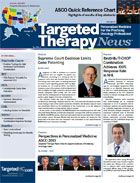Ganetespib-Docetaxel Combination Improves Survival
Salvage therapy combining the novel Hsp90 inhibitor ganetespib with docetaxel significantly improved OS in some patients with NSCLC in the phase IIb/III GALAXY- 1 trial.
Suresh Ramalingam, MD
Salvage therapy combining the novel heat shock protein 90 (Hsp90) inhibitor ganetespib with docetaxel significantly improved overall survival (OS) in some patients with non-small cell lung cancer (NSCLC) in the phase IIb/III GALAXY- 1 trial. The results were presented at the 2013 Annual Meeting of the American Society of Clinical Oncology (ASCO).
“This is the first randomized trial to document improvement in efficacy of an Hsp90 inhibitor in patients with cancer,” said Suresh Ramalingam, MD, professor of Hematology and Medical Oncology, and director of the Division of Medical Oncology at the Winship Cancer Institute of Emory University in Atlanta, Georgia. Hsp90 belongs to a class of proteins known as “chaperones,” which help other proteinsincluding those involved in cancer growth— assume the proper shape needed to perform their biologic functions.
The phase II, open-label GALAXY-1 trial randomized 252 patients with stage III/ IV lung adenocarcinoma 1:1 to docetaxel alone (75 mg/m2 on day 1 of a 3-week cycle; n = 127) or the same dose of docetaxel plus ganetespib (150 mg/m2 on days 1 and 15; n = 125).
There was a nonsignificant improvement in OS in the ganetespib arm versus the control arm (9.8 vs 7.4 months; hazard ratio [HR] = 0.82; P = .082). There was also a trend toward improved progression-free survival (PFS) (4.5 months for ganetespib vs 3.2 months for the control group; HR = 0.84; P = .038).
In a prespecificed group of patients enrolled in the trial more than 6 months after diagnosis (n = 176), there was a significant 4.3-month OS advantage with ganetespib (10.7 vs 6.4 months; HR = 0.61; P = .0093). PFS was also significantly improved in the treatment arm (5.4 vs 3.4 months; HR = 0.61; P = .0041).
The ganetespib combination was well tolerated with a toxicity profile similar to docetaxel monotherapy. In the treatment arm, the most common adverse event (AE) across all grades was diarrhea (48%), which was usually manageable through over-the-counter treatments. The most frequently reported grade 3-4 AEs for ganetespib versus the control group were neutropenia (37% vs 38%), febrile neutropenia (11% vs 2%), and anemia (8% vs 2%).
“This research unto itself isn’t practice changing, but I think it does merit further investigation in this prespecified subgroup [of patients >6 months postdiagnosis]” said Marjorie G. Zauderer, MD, an ASCO spokesperson who participated in the press briefing where the trial results were presented.
Clinical Pearls
- This is the first randomized trial to document improvement in efficacy of an Hsp90 inhibitor in patients with cancer
- In patients enrolled more than 6 months after diagnosis, treatment with ganetespib significantly improved OS and PFS
- An extension phase of GALAXY-1 is focusing on biomarker analysis, with results expected later this year
The acceptable toxicity profile for ganetespib is critical because safety issues have derailed promising Hsp inhibitors in the past. “The first generation of Hsp inhibitors had a lot of toxicities and formulation issues,” said Ramalingam.
An extension phase of GALAXY-1, focusing on biomarker analysis, recently completed accrual, with results expected to be reported later this year. In addition, the phase III GALAXY-2 trial will compare second-line ganetespib plus docetaxel versus docetaxel alone in advanced lung cancer patients with adenocarcinoma histology and will only enroll patients who are more than 6 months past a diagnosis of advanced disease. The target enrollment is 500 patients, and the primary endpoint is overall survival.
Ramalingam SS, Goss GD, Andric ZG, et al. A randomized study of ganetespib, a heat shock protein 90 inhibitor, in combination with docetaxel versus docetaxel alone for second-line therapy of lung adenocarcinoma (GALAXY-1).J Clin Oncol

Amivantamab/Lazertinib Shows OS and PFS Benefits in EGFR-Mutated NSCLC
April 21st 2025During a live event, Xiuning Le, MD, PhD, discussed updated intracranial efficacy, overall survival, and safety of amivantamab plus lazertinib in patients with EGFR-mutated non–small cell lung cancer.
Read More


















